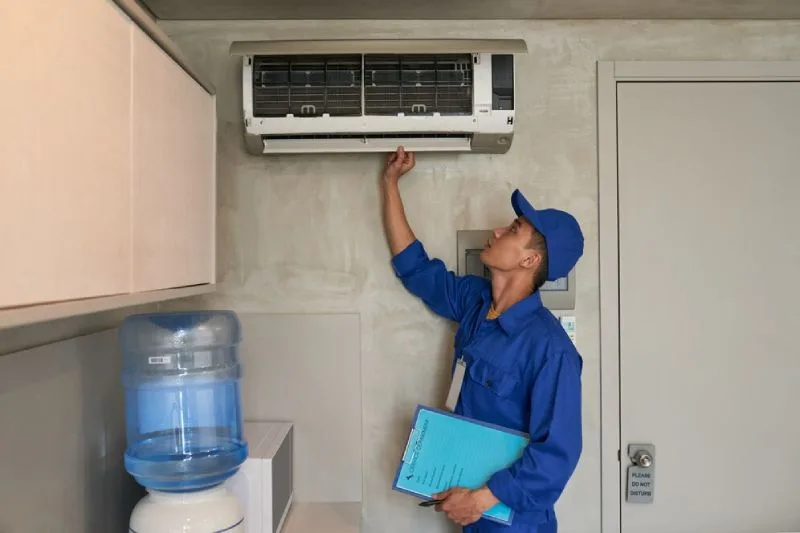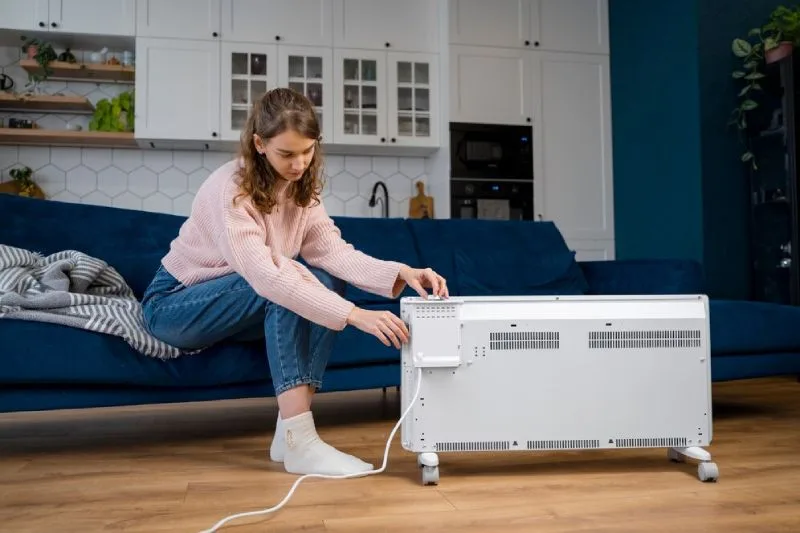Air conditioners are essential for keeping indoor spaces cool and comfortable. Although split AC units are more widely known, water-cooled air conditioners present a strong alternative.
In this article, we’re here to introduce you to the benefits, efficiency, and cost-saving potential of water-cooled AC. We’ll also help you understand how these systems work and why they might be the perfect solution for your cooling needs in the Sunshine State.
What Are Water-Cooled Air Conditioning Systems?
One increasingly popular choice is the water-cooled air conditioner. What makes it so appealing?
Air-cooled systems use fans and outdoor air to dissipate heat, whereas water-cooled systems use water to carry heat away. While both have their advantages, water-cooled AC systems typically offer higher energy efficiency, quieter operation, and better cooling in high-temperature environments. However, they may require more maintenance and installation costs.
The choice between a water-cooled air conditioner and an air-cooled AC system depends on your specific needs and budget. Our experts can help you make the right decision for your Florida home.
How Water-Cooled Air Conditioning Systems Work
Water-cooled air conditioner systems have emerged as a brilliant solution, offering remarkable energy efficiency. These AC units excel in providing precise temperature control and efficient heat transfer. They are a smart choice for keeping your Sarasota home cool and your energy bills manageable.
System Components and Their Roles:
- Cooling Tower — This critical component cools the water by releasing excess heat into the atmosphere.
- Chiller — It circulates chilled water to absorb heat from your home’s air.
- Condenser — The heat-laden water returns to the condenser, releasing heat into the cooling tower.
- Evaporator — Chilled water circulates through the evaporator coil, providing cool air for your home.
- Pump — A pump keeps the water circulating smoothly throughout the system.
How Water-Cooled AC Works:
- Water serves as the cooling medium, efficiently transferring heat.
- The cooling tower cools water through evaporation.
- The chiller reduces water temperature.
- Chilled water absorbs heat from indoor air via the evaporator coil.
- Heat is expelled outside, ensuring consistent cooling while maximizing energy efficiency.
Benefits of Choosing a Water-Cooled Air Conditioner
Water-cooled air conditioner systems stand out as eco-friendly champions in the quest for a comfortable indoor climate in your home. Switching to water-cooled AC keeps you cool and aligns your comfort with environmental consciousness, contributing to a more sustainable approach. Here’s why they’re not just good for your pocket but also the planet:
- Energy Efficiency — Water-cooled AC units consume less electricity, leading to significant energy savings and lower utility bills.
- Quiet Operation — These systems are known for their quieter performance compared to their air-cooled counterparts, ensuring peace and comfort.
- Improved Cooling — Water-cooled systems excel in maintaining cool temperatures, even in extreme Florida heat.
- Environmental Friendliness — By using water as a cooling medium, they reduce carbon emissions, making them a greener choice.
Water-Cooled Air Conditioning System Maintenance
Your water-cooled air conditioner system is your comfort-saver. To ensure it keeps you cool and comfortable, regular maintenance is essential. By following these maintenance tips, you’ll not only stay comfortably cool but also extend the life of your water-cooled AC while minimizing the chances of costly breakdowns.
- Monitor Water Levels — Regularly check and maintain appropriate water levels in the system to prevent overheating and ensure efficient cooling.
- Clean Cooling Towers — Periodically clean cooling tower fill material and basins to optimize heat dissipation and prevent clogs.
- Inspect Pumps and Pipes — Ensure pumps and pipes are in good condition, free from leaks, and functioning efficiently to maintain smooth water circulation.
- Professional Tune-Up — Schedule an annual professional service to address potential issues, clean components, and keep your water-cooled air conditioner operating at peak performance.
Pros and Cons of Water-Cooled Air Conditioners
Water-cooled air conditioner systems offer several advantages. They are renowned for their energy efficiency, resulting in lower electricity consumption and reduced energy bills. These systems operate quietly, providing a peaceful environment. In hot climates like Florida, they excel in maintaining comfortable indoor temperatures.
However, it’s important to consider a couple of drawbacks. The initial installation costs can be relatively high compared to other options, which may deter some homeowners. Additionally, these systems require regular maintenance to ensure optimal performance and longevity.
Pros of water-cooled air conditioners
When it comes to cooling your Florida home, water-cooled air conditioning systems shine with remarkable benefits. By choosing water-cooled AC, you invest in a greener, cost-effective, and consistently comfortable home.
- Energy Efficiency — Water-cooled AC units are renowned for their impressive energy efficiency, reducing electricity consumption and saving money on energy bills.
- Lower Environmental Impact — These systems use water as a cooling medium, significantly reducing carbon emissions and making them an eco-conscious choice that benefits both your home and the environment.
- Consistent Cooling Performance — Water-cooled AC maintains steady indoor temperatures, ensuring comfort even in the hottest Florida weather.
Cons of water-cooled air conditioners
While water-cooled AC systems offer benefits, it’s important to note potential drawbacks. The installation process can be more complex and costly. Additionally, these systems consume water, which may raise concerns in water-scarce regions. However, proper management and regular maintenance can mitigate potential environmental impacts, making water-cooled AC a viable choice for many homeowners.
- Frequent Inspections — Regularly check water levels and system components for leaks and wear.
- Cleaning Procedures — Clean cooling towers, coils, and basins to prevent clogs and maintain efficiency.
- Professional Servicing — Schedule annual professional check-ups to address issues and ensure smooth operation.

Water Cooled-Air Conditioner FAQs
Are water-cooled air conditioners any good?
Yes, water-cooled air conditioners are a good choice for many situations. They are known for their energy efficiency, quiet operation, and consistent cooling performance. However, the suitability of a water-cooled AC depends on factors like your climate, budget, and installation options.
Is water-cooled AC better than air-cooled?
The choice between water-cooled and air-cooled AC depends on your specific needs. Water-cooled systems are generally more energy-efficient and better at maintaining consistent temperatures in hot climates. However, they can be costlier to install and may have higher water consumption, making air-cooled AC a more practical choice for some.
What is water cooling air conditioner?
A water-cooling air conditioner, often referred to as a water-cooled AC, is a type of air conditioning system that uses water as a cooling medium. It circulates chilled water to remove heat from indoor spaces, providing cool air. These systems are designed to offer energy-efficient cooling while minimizing the environmental impact.
How does chilled water air conditioner work?
Chilled water air conditioners work by circulating chilled water through coils and air handlers. The process involves removing heat from the indoor air, which causes the water to warm up. This warm water is then sent to a cooling tower, which releases heat through evaporation. The cooled water is returned to the air handlers to continue cooling the indoor air, maintaining a comfortable temperature in your space.
Conclusion
Water-cooled AC systems offer various advantages, including energy efficiency, quiet operation, and effective cooling. Yet, they come with installation complexities and water consumption considerations. As you explore your cooling options, we encourage you to evaluate your unique requirements. Your climate, budget, and environmental concerns should guide your choice. We’re here to assist you in making the best decision for your Florida home. Contact us for personalized guidance and expert insights tailored to your specific needs.




